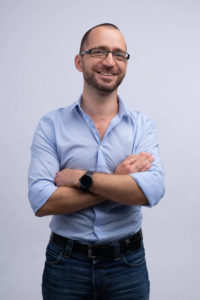
It inspires her when she can help others show themselves on stage. She gently suggests others what they could work on and develop. In this contest season she missed the power of personal presence and the 50-100 pairs of eyes looking at her as she stands in front of the audience. Who is she?
Csaba Valkai’s conversation partner was no other than the winner of the national English evaluation contest 2020 of Toastmasters, Enikő Mária Domján. On 16 May Enikő, will represent the Hungarian Toastmasters community in the District contest together with Alex Macintosh, who took the second place. The best speakers of 7 European countries will compete with each other for the title of District champion.
When and how did you join Toastmasters and with what objective?
I joined Toastmasters in 2016. Adam Horváth, who was already then an experienced member,suggested that I should have visited a club because he thought I would really like it. I was postponing it months because I didn’t have time. When I found the time to visit, I immediately got hooked. I’m working in the field of communication (PR and marketing communication) so my first objective was to further develop my communication skills. However, after some time I realized the positive effect Toastmasters had on my leadership skill as well.
What made you stay here? What did you like the most on your first visit?
It’s hard to mention one specific thing. What comes to mind – and Toastmasters promote themselves with this – is the supportive community. It was already a nice experience on the first event that everyone tried to help each other and everyone got the opportunity to learn and grow. Besides, I also liked the structure of the meeting and the whole education system.
Since you became a member, what changes did you realise on yourself?
Lots of changes! I don’t say it because it is a mandatory requirement but because I really experienced it.
Firstly, in the field of communication. Thanks to my parents I performed a lot since my childhood, therefore I had good basics. Since I joined Toastmasters I communicate more consciously and in a more organized manner. I see it in my work as well that in oral and in written language, I use my messages more consciously and I talk in a more structured way.
Secondly, in the field of leadership. Thanks to the fact that I was the president of PestBeszéd Toastmasters Club for one year, I could incorporate my experience gained here into my work as well. Of course it had an impact in both directions: I could use the skills I learned from Toastmasters in my work, and I could also implement the experiences from my work in Toastmasters.
The third thing is giving feedback. The technics I learn at Toastmasters and the fact that I practice constantly gives me self-confidence at such a level that I dare to give feedback to anybody. Obviously I have to find the right situation, style, tone of voice, but this experience is a big gift from Toastmasters.
By the way, did you compete before?
2 years ago, in 2018, I competed for the first time. I competed in evaluation and in speech contest in Hungarian. I took second place in both categories at the division level. It was an honour and a huge experience to come second behind Erika Seres, since then I have learnt a lot from her.
Do you prefer to compete in a speech or in evaluation contest?

I like both because both have their own beauty, so it would be hard to choose only one. I really enjoy writing a speech, then standing in front of people and inspiring them. In addition, I also love the process of putting a speech together and refining it.
The art of evaluating is a spontaneous thing because you never know who the target speaker is, who you have to evaluate. I have my own technics, methods that I can use but after all I have to improvise at that moment.
At the competition in May, why did you choose the evaluation?
Originally I couldn’t have attended the contest because of another plan but fortunately things changed. Since I’m a competitive person, I wouldn’t have competed just in the club competition because if there was nothing at stake, competing is not a real thing. In the last moment, the area contest was postponed, but I didn’t have any time left to prepare myself for a speech, so I chose evaluation.
Do you prefer to compete in Hungarian or in English?
Until now, I was speaking in Hungarian in Toastmasters and I started to challenge myself in English this year. Concretely, this contest was the first occasion where I evaluated in English.
My purpose was to face a new challenge and to take my communication skills to a higher level because it is completely different when I speak in English at work and when I deliver or evaluate a speech in a foreign language.
Both languages are special in their own way. In English, obviously, it’s a challenge for me since I am not competing in my mother tongue and this is an extra thing that I have to adapt to. In this case I try to rely on my previous experiences what I have already gained in Hungarian and I try to provide the same level in English as well.
Do you change your technics in the contest?
No. I have already developed my own technic. It means I have my own evaluation template, my own set of criteria and I always use that. Besides, I always try to rely on my personal strength and bring my personality into the evaluation.
When you found out that the competition was online, what was your first thought?
When I heard that the competition will be online, honestly, I didn’t like it because I strongly believe in the power of personal presence. I think it can add value to the speech or to the presentation, therefore I usually rely on my personal presence, on my personal appeal, and on my stage presence.
Online we can’t deliver our speech in the same way, it’s much more difficult to provide the same energy. However, as I was thinking about it, I saw the opportunity as well. This is a new field, where people can develop themselves from a different perspective. For example, how to create the personal presence online, how to use the body language or how to keep the eye contact.
Regarding all these things, what similarities and differences did you see between offline and online competition?
The similarity is the content itself.
The difference is that I have to adapt to the circumstances, to immediately get the feeling of the speaker and the audience. I don’t just arrive to the scene but I have to create the environment. For example, I had to rearrange the room to find the optimal background and the optimal lights. Of course I also had to get used to the lack of 50-100 pairs of eyes, however, the organizing team did everything to create the best conditions for us online as well.
Thank you for this conversation, Enikő.
The Hungarian Toastmasters community will cheer for you on Saturday, 16th May!

